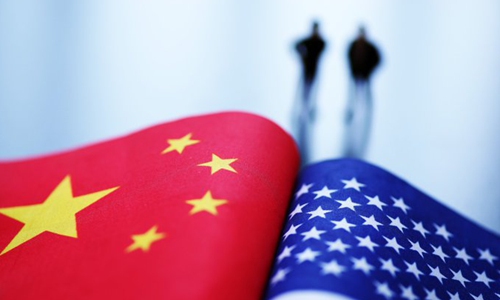Washington pressure tactics on Beijing are sure to boomerang
By Zhao Minghao Source:Global Times Published: 2020/2/11 18:53:40

File photo: IC
Chinese President Xi Jinping on Friday spoke on the phone with US President Donald Trump, sending the world a positive signal about the bilateral ties between China and the US. Trump expressed his confidence in China's economic growth, and said the US fully supports China's efforts to control the novel coronavirus pneumonia (NCP). The two leaders also reaffirmed their commitment to implementing the phase one trade deal reached between the two countries in January.
The outbreak of the NCP will affect the economy of China and the rest of world. If the situation deteriorates, the US economy won't be able to bloom alone either. China-US cooperation is needed now more than ever.
When SARS broke out 17 years ago, China's share of global GDP was 4 percent. It's now 17 percent. Maintaining steady development of the Chinese economy is not only fundamental in battling the epidemic, but also can have a vast impact on the global economy. Washington should not pile more pressure on Beijing, or even promote its "decoupling" from China's economy and technology amid the outbreak.
A view holds that if the NCP continues, the Trump administration should consider calling off the tariff imposed on Chinese imports. Peter Navarro, White House trade advisor, and an anti-China economist as well, in late January rejected that idea, arguing Washington should maintain the tariffs.
Over 4,500 US firms have made requests for exemptions from the tariffs on Chinese imports, saying they haven't found viable or cost-effective alternatives to Chinese products. Yet the Trump administration, ignoring difficulties the enterprises are facing, has defended the tariffs and is granting fewer exemptions.
The ongoing epidemic has had a negative impact on US companies operating in China. China still plays a core role in the global supply chain and the production suspension of some factories due to the disease will inevitably affect US companies in China. According to a survey conducted by the American Chamber of Commerce in Shanghai, 87 percent of member companies anticipated the NCP will have a direct negative impact on their revenue, and around 25 percent of them believe the epidemic could reduce their China revenue by more than 15 percent in 2020. In view of the difficulties facing US companies, the Trump administration should act more proactively to help maintain the stability of the Chinese economy
While Chinese tech companies play a key role in keeping the Chinese economy stable, the Trump administration has been ramping up plans to escalate the technology "cold war" against Chinese companies. The US government has imposed more restrictions on exports of high-tech products to China and has constrained exports of artificial intelligence software to the world's second-largest economy. The superpower has enhanced its export controls, and its scope of emerging technologies that are essential to US national security is expanding.
The Trump administration is also making attempt to strengthen the technological containment on China worldwide. Under current rules, the US Commerce Department could block the sale of certain goods shipped to China if over 25 percent of their value is made up of US-made components that could be considered relevant to national security. Under a proposed new threshold, the figure would be lowered to 10 percent, and the scope would be expanded to non-sensitive, commercial technologies.
The escalating crackdown by the US on Huawei, a Chinese high-tech giant, has upset the Chinese public. Huawei, a private corporation, employs 188,000 staff around the world and has operations in over 170 countries and regions. A study conducted by Oxford Economics shows that in 2018, Huawai contributed 12.8 billion euros ($14 billion) to Europe's GDP, employed 169,700 Europeans, and paid 5.6 billion euros in taxes. Despite these contributions to growth, the US has imposed increasing pressure on many European countries to exclude Huawei from their 5G network.
If Washington continues to pursue destructive economic policies aimed at China while it battles NCP, it will not only be seen as intolerant and immoral, but those very policies will significantly affect the US economy and others around the world. If the outbreak cannot be effectively controlled, or if China's economy suffers a major downturn, the US will also pay a high price.
It is reported the White House National Economic Council and the Council of Economic Advisers are jointly examining the potential short-term and long-term effect of the NCP. It is expected Washington will reevaluate the significance of coordination and cooperation with Beijing.
The author is a senior research fellow at the Charhar Institute and an adjunct fellow at the Chongyang Institute for Financial Studies at Renmin University of China. opinion@globaltimes.com.cn
Posted in: VIEWPOINT,CHINA-US,MORE